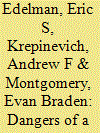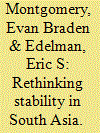| Srl | Item |
| 1 |
ID:
099666


|
|
|
|
|
| Publication |
2010.
|
| Summary/Abstract |
Like clockwork, at the end of every decade for the last fifty years, the subject of America's decline comes up. As if on cue, for instance, the National Intelligence Council's November 2008 report, Global Trends 2025, argued that "the international system-as constructed following the Second World War-will be almost unrecognizable by 2025 . . . [It] will be a global multipolar one with gaps in national power continuing to narrow between developed and developing countries." This conclusion represented a striking departure from the NIC's view in 2004 that the United States was likely to continue its dominance of the international system.
|
|
|
|
|
|
|
|
|
|
|
|
|
|
|
|
| 2 |
ID:
100571


|
|
|
|
|
| Publication |
2011.
|
| Summary/Abstract |
Iran's acquisition of a nuclear bomb would upend the Middle East. It is unclear how a nuclear-armed Iran would weigh the costs, benefits, and risks of brinkmanship, meaning that it could be difficult to deter Tehran from attacking the United States' interests or partners in the region.
|
|
|
|
|
|
|
|
|
|
|
|
|
|
|
|
| 3 |
ID:
137246


|
|
|
|
|
| Summary/Abstract |
India and Pakistan are currently engaged in a competition for escalation dominance. While New Delhi is preparing for a limited conventional campaign against Pakistan, Islamabad is pursuing limited nuclear options to deter India. Together, these trends could increase the likelihood of nuclear conflict. India, for example, might conclude that it can launch an invasion without provoking a nuclear reprisal, while Pakistan might believe that it can employ nuclear weapons without triggering a nuclear exchange. Even if war can be avoided, these trends could eventually compel India to develop its own limited nuclear options in an effort to enhance deterrence and gain coercive leverage over Pakistan.
|
|
|
|
|
|
|
|
|
|
|
|
|
|
|
|
| 4 |
ID:
142696


|
|
|
|
|
| Summary/Abstract |
The nuclear deal that the United States and five other great powers signed with Iran in July 2015 [1] is the final product of a decadelong effort at arms control. That effort included sanctions in an attempt to impede Iran’s quest for a nuclear weapons capability. The Joint Comprehensive Plan of Action , or JCPOA, ranks as one of the most deficient arms control agreements in history. But U.S. President Barack Obama has pledged to spend the remainder of his tenure fending off congressional pressures to adjust its terms
|
|
|
|
|
|
|
|
|
|
|
|
|
|
|
|